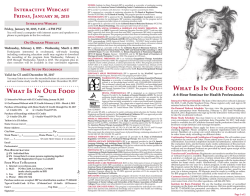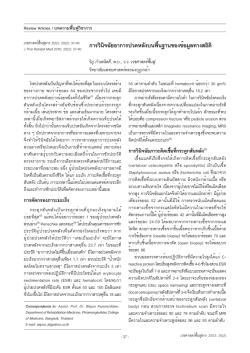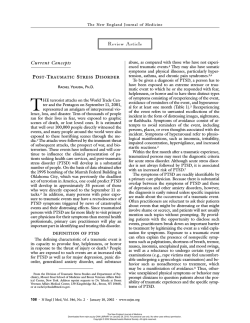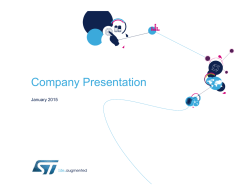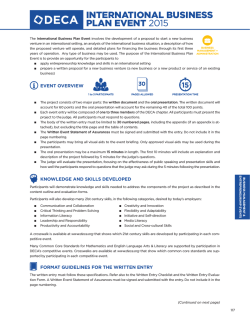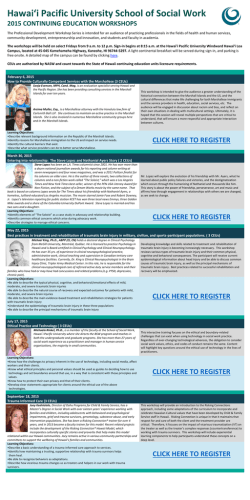
Understanding and Treating Posttraumatic Stress Disorders
Interactive Webcast Friday, February 13, 2015 Interactive Webcast Friday, February 13, 2015, 9 AM – 4 PM PST You will need a computer with internet access and speakers or a phone to participate in the live webcast. On-Demand Webcast Wednesday, February 18, 2015 – Wednesday, March 18, 2015 Participants interested in on-demand, self-study learning including continuing education credit may register to download the recording of the program from Wednesday, February 18, 2015 through Wednesday, March 18, 2015. The program plus in-class exercises will be available in four convenient segments. Home Study Recordings Valid for CE until August 12, 2016 You may listen to or view the recorded lecture at your convenience and earn home study credit. Expiration date: August 12, 2016 Understanding and Treating Posttraumatic Stress Disorders one: q Interactive Webcast with CE Credit: Friday, February 13, 2015 q On-Demand Webcast with CE Credit: February 18, 2015 – March 18, 2015 Purchase of Recordings with Home Study CE Credit: through August 12, 2016 q 4 Audio CDs or q 4 Audio-Visual DVDs Purchase of Recordings without CE Credit: q 4 Audio CDs, $50 q 4 Audio-Visual DVDs, $75 Tuition is in US dollars. Name (please print) Home Address City/State Work Phone ( Fax ( , ) ) Zip Home Phone ( ) (please print email if available) Email Profession(s) Pre-Registration q $79 Individual Rate q $74 Group Rate (3 or more persons registering together) $89 On-Site Registration (if space is available) 1. Internet: www.ibpceu.com 2. Mail: PO Box 2238, Los Banos, CA 93635 (make check payable to IBP) 3. Fax: (877) 517-5222 4. Phone: (866) 652-7414 Purchase orders are accepted. IBP tax identification number: 77-0026830 Type of Credit Card: q Visa q MasterCard q AmEx q Discover Card # Signature Exp Date / Four Ways To Register NURSES: Institute for Brain Potential (IBP) is accredited as a provider of continuing nursing education by the American Nurses Credentialing Center’s Commission on Accreditation. IBP is awarded “accreditation with distinction,” the highest recognition awarded by the ANCC. IBP is approved as a provider of continuing education by CA Board of Registered Nursing, Provider #CEP13896, and FL Board of Nursing. This program provides 6 contact hours. PSYCHOLOGISTS: IBP is approved by the American Psychological Association to sponsor continuing education for psychologists. IBP maintains responsibility for this program and its content. This program provides 6 hours of CE credit. IBP is approved as a provider of CE by the California Board of Behavioral Sciences, #PCE 3743, and by the FL Board of Psychology. This course provides 6 hours of CE credit. COUNSELORS, SOCIAL WORKERS & MARRIAGE AND FAMILY THERAPISTS: IBP, provider #6342, is an NBCC-Approved Continuing Education Provider (ACEPTM) and may offer NBCC-approved clock hours for events that meet NBCC requirements. IBP solely is responsible for all aspects of the program. This program provides 6 clock hours of continuing education credit. IBP, provider 1160, is approved as a provider for continuing education by the Association of Social Work Boards (ASWB), 400 South Ridge Parkway, Suite B, Culpeper, VA 22701. www. aswb.org. ASWB Approval Period: 11/11/2014 – 11/11/2017. Social workers should contact their regulatory board to determine course approval. Social workers will receive 6 clinical continuing education clock hours for participating in this intermediate-level course. IBP is approved as a provider of CE by the California Board of Behavioral Sciences, #PCE 3743, by Florida Board of Clinical Social Work, MFT and Mental Health Counseling, by Ohio CSWMFT Board, Provider #RCST030801, by Illinois Department of Professional Regulation MFT CE Sponsor Program, Sponsor #168.000183, and by TX State Board of Examiners of Marriage & Family Therapists, Provider #830. This program is 6 CE hours. OCCUPATIONAL THERAPISTS: IBP is an American Occupational Therapy Association (AOTA) Approved Provider, #6050. The assignment of AOTA CEUs does not imply endorsement of specific course content, products, or clinical procedures by AOTA. This program provides 0.6 AOTA CEUs or 6 contact hours. Content Level: Intermediate. Content Focus: Domain of OT, Areas of Occupation and Occupational Therapy Process, Outcomes. Only CDs and DVDs of the program qualify for AOTA credit. This course is approved by the FL Board of Occupational Therapy for 6 hours of credit. SUBSTANCE ABUSE PROFESSIONALS: IBP is approved by the NAADAC Approved Education Provider Program, Provider #751. This program provides 6 CEHs. PHARMACISTS: IBP is accredited by the Accreditation Council for Pharmacy Education as a provider of continuing pharmacy education. The interactive webcast is an application-based activity with UAN:0492-0000-13-013-L04-P. The on-demand webcast and home study CDs/DVDs are knowledge-based activities with UAN: 0492-0000-13-014-H04-P. Initial Release Date: 08/12/13. Planned Expiration Date: 08/12/16. This program is designated for 6 hours (.6 CEU). DENTAL PROFESSIONALS: IBP is designated as an Approved PACE Program Provider by the Academy of General Dentistry (AGD). The formal continuing dental education programs of this provider are accepted by the AGD for Fellowship/Mastership and membership maintenance credit. Approval does not imply acceptance by a state or provincial board of dentistry or AGD endorsement. The current term of approval extends from 12/01/14 – 11/30/18. Provider ID# 312413. This program provides 6 hours of CE credit. Subject Code: 557. Release Date: 08/12/2013. Planned Expiration Date: 08/12/2016. IBP, provider RP-4261, is authorized to confer continuing dental education for Dentists, Dental Hygienists and Dental Assistants by the Dental Board of California. IBP is an approved provider with the Florida Board of Dentistry. This program is 6 CE hours. PHYSICAL THERAPISTS: This program is approved by IBP – an accredited approver by the Physical Therapy Board of CA. IBP is an IL Dept. of Professional Regulation Approved CE Sponsor for PTs and PTAs, #216.000210. This program has been approved by the TX chapter of the American Physical Therapy Association (TPTA). This program is 6 CE hours. The physical therapy boards in AK, AZ, DE, GA, KY, MS, MO, NC, OR, TN, UT, and VA accept courses approved by the PT licensing boards of other States and/or APTA chapters. This course meets the criteria for 6 contact hours of physical therapy continuing education in CT, IA, KS, MO, MT, NE, NH, OR, TN, and WI. MASSAGE THERAPISTS: IBP is an approved CE provider by IL Dept. of Professional Regulation, #245.000045, and by FL Board of Massage Therapy. This course is 6 CE hours. SPEECH-LANGUAGE PATHOLOGISTS: IBP is an approved provider by the CA SpeechLanguage Pathology and Audiology Board (SLPAB), # PDP247, and by the Florida Board of Speech-Language Pathology and Audiology. Only the live webcast and the seminar qualifies for SLP CE credit in Florida. This program provides 6 CE hours. DIETITIANS: IBP is a Continuing Professional Education (CPE) Accredited Provider with the Commission on Dietetic Registration (CDR). Registered dietitians (RDs) and dietetic technicians, registered (DTRs) will receive 6 continuing professional education units (CPEUs) for completion of this program/materials. Continuing Professional Education Provider Accreditation does not constitute endorsement by CDR of a provider, program, or materials. Only the webcast qualify for CDR credit. RESPIRATORY CARE PROFESSIONALS: RCPs in New York receive 6 hours of Category III credit through the ANCC. IBP is accredited as a provider of continuing nursing education by the American Nurses Credentialing Center’s Commission on Accreditation. IBP is approved by the California Board of Registered Nursing (CA BRN), Provider #CEP13896, to provide continuing education. Programs offered by the CA BRN approved providers of CE are accepted by the Respiratory Care Board of California. EDUCATORS: Participants completing this program will receive 7.5 clock hours of professional development credit through a cosponsorship agreement between Alliant International University and IBP. Alliant International University’s graduate programs are accredited by the Accrediting Commission of Senior Colleges and Universities of the Western Association of Schools and Colleges. Please contact your school district if you need prior approval for this program. COLLEGE EDUCATED PUBLIC: This program is recommended for individuals who wish to add to their personal and professional knowledge and to improve their health and wellbeing. Participants will receive a certificate of completion for 6 hours. Understanding and Treating Posttraumatic Stress Disorders A 6-Hour Program for Health Professionals Interactive Webcast Schedule: The date of the interactive webcast is February 13, 2015, 9 AM, Pacific Standard Time. Please register early and sign-in 30 minutes before the time of the webcast. On-Demand Webcast Schedule: You may view the program in segments at your convenience from Wednesday, February 18, 2015 until Wednesday, March 18, 2015. Registrants who sign up for the interactive webcast may elect to take the on-demand webcast. Home Study Schedule: You may listen to or view the recorded lecture at your convenience until the expiration date: August 12, 2016. Self-study credit is available for all California-licensed health professions listed on the brochure except dietitians and massage therapists. Group Registrations: Rates apply for three or more pre-registered guests enrolling together. Please complete a separate registration form for each person. Members of a group can watch interactive or on-demand webcast, or order home study recordings on different dates. Confirmation Notices and Certificates of Completion: We will confirm your registration by email or by letter. Please attend even if you do not receive a confirmation. Successful completion includes full attendance, submission of the evaluation form, and for home study credit, submission of the post-test. No partial credit will be given. Certificates of completion for the interactive webcast and on-demand webcast are provided by email upon receipt of the evaluation form and the post-test. Transfers and Cancellations: Registrants can transfer to another live seminar or webcast if space is available. Registrants canceling up to 48 hours before a seminar or webinar can receive a tuition refund less a $15 administrative fee or an audio CD or DVD recording of the program with the instructional outline for home study credit. Alternatively, a full-value voucher can be obtained good for one year for a future program. In the unlikely event that the program cannot be held (e.g., an act of God), registrants will receive free admission to a rescheduled program or a full-value voucher, good for one year, for a future program. All requests must be made in writing or online. No IBP program has ever been cancelled as the result of low attendance. Customer Service: Call 888-202-2938 to ask about course content, instructors, request accommodations for disability, submit a formal grievance, or remove your name from a list. For other questions, call 866-652-7414. Institute for Brain Potential: We are the leading provider of accredited programs on the brain and behavioral sciences. Our non-profit organization (tax ID 77-0026830) has presented cost-effective, informative and practical seminars by outstanding speakers since 1984. Page 1 of 2 Understanding and Treating Posttraumatic Stress Disorders FREQUENTLY ASKED QUESTIONS Q: Is there a way to enjoy this program without being at my computer for 6 hours? What if I am not free on February 13, the date of the broadcast? Yes! First, register for the program. You will receive a link to view the program starting February 18 until March 18. The program will be divided into four segments of approximately 75 minutes for user-friendly viewing. Q: What if I have technical issues getting and staying connected, difficulty seeing the slides, or hearing the speaker? We have an expert videographer to capture the sound and slides. We will make copies of the outline available to the participants. Further, in the unlikely event that you have connection problems, IBP will provide registrants with a free set of 4 CDs or DVDs of the entire program. Q: I’d like to view the program and receive credit but without watching the live program or downloading it and still receive continuing education credit. Can I do this? Yes! The cost of the DVD or CD set will be the same as the cost of the live program. Register now, let the operator know you will want the CD or DVD set, and make sure your profession is included in our online brochure. Q: Can I attend this program live? Yes, but only if you live in a city where IBP is currently presenting this seminar. Q:My profession is not included on the brochure. Can I receive continuing education credit? Maybe. Please contact our customer service at (888) 202-2938. Q: How long does it usually take to receive a certificate of completion? Typically, within 3 or 4 business days. This program presents the spectrum of PTSD including differential diagnosis, brain-related changes, pharmacological and psychological treatments in children, adults, patients, health professionals, veterans, and the elderly. Participants completing this program should be able to: 1. Identify key forms of PTSD, common coexisting conditions and differential diagnosis. 2. Identify brain-related changes associated with PTSD and PTSD that coexist with mild traumatic brain injury. 3. Describe common characteristics of PTSD as it affects children, adults, the military population, health professionals and the elderly. 4. List several pharmacologic agents indicated for PTSD. 5. Describe several evidence-based psychological therapies for PTSD. PTSD Spectrum Disorders •• Changes in PTSD Criteria: four key symptom clusters: reexperiencing, avoidance, negative cognitions and mood, and disorders of arousal; how PTSD differs from acute stress disorder and other responses to highly stressful events. •• Differential Diagnosis: role of lab tests that assess thyroid hormone, cortisol, and tests that rule out other medical conditions; key screening instruments. •• Common Coexisting Conditions: chronic pain, substance use disorders, anxiety, depression, bipolar disorder, borderline personality disorder, traumatic brain injury and suicidal behavior. •• Primary Exposure: high-risk events include physical abuse, domestic violence, natural disasters, tragic accidents, invasive and painful medical procedures, facing serious illnesses, severe burns, molestation, rape, threat with a weapon, and combat; up to 10% of people experiencing a loss of a loved one develop PTSD. •• Secondary Exposure: high-risk events occur in first responders and health professionals who develop PTSD as a result of witnessing medical and psychiatric crises. Neurobiology •• Stress-Related Brain Pathology: hippocampal shrinkage, intrusive memories and cortisol, emotional memories, hypervigilence and sensitization of the amygdala; circuitry of prefrontal cortex, and altered social reasoning, attention and mood. •• PTSD With Co-existing Traumatic Brain Injury: common areas of prefrontal cortex affected and the role of cognitive impairment, pain, and depression. •• The Recovering Brain: neuroimaging of pathology, restoration of lost functions in combination with pharmacologic and non-drug therapies including CBT and exposure-based therapies. How Traumatic Experiences Are Processed •• Children: potential lifelong alteration of receptors for cortisol following harsh maltreatment and severe, early neglect, the enduring risk of suicide. •• Adults: how cognitive problems and overwhelming affect impair ability to cope and recover; psychological processes underlying resiliency and healing; how we can inherit our parent’s traumatic memories. •• Combat-Related PTSD: why many cases become severe and chronic: pain, substance use disorders, depression, anxiety, personality disorders; the residual role of shame, survivor guilt, anger and suicidal behavior. •• Patients: 25% of patients with stroke or TIA develop PTSD; the high rate of intrusive memories in people with heart attack and other lifethreatening conditions. •• Health Professionals At-Risk of PTSD: the effects of witnessing people with medical or psychiatric emergencies, secondary PTSD, numbing, and emotional exhaustion. •• PTSD in the Elderly: traumatic memories, e.g., loss of a loved one in people over age 65 often provokes recurring traumatic memories in addition to grief and depression. Pharmacotherapy •• Significant Benefit: Department of Defense Guidelines: selective serotonin reuptake inhibitors SSRIs--paroxetine and sertraline (FDA-approved) and fluoxetine and the selective norepinephrine reuptake inhibitor (SNRI), venlafaxine. •• Some Benefit: mirtazapine (an SSRI), prazosin (use for sleep/ nightmares) tricyclics; risks with nefazodone and MAO inhibitors. •• Ineffectual or Harmful: benzodiazepines (harmful), tiagabine, guanfacine, valproate, and topiramate. •• PTSD with Chronic Pain: SNRIs and TCAs. •• PTSD with Traumatic Brain Injury: use of SSRIs and SNRIs in lower doses; avoidance of anticholinergic, sedative-hypnotic, and antipsychotic drugs. Non-Medical Treatments •• Crisis Intervention: what to say and do; what not to say and do: revision of critical incident debriefing; screening and assessment tools, e.g., suicide risk, coexisting disorders. •• Sleep Enhancement: the “royal road” to brain stabilization; keys to improving the quality of sleep; treatment of nightmares. •• Cognitive Behavioral Therapy: applying behavioral modification and cognitive restructuring to help adapt to life situations. •• Exposure Therapy: deconditioning subcortical fear and repetitive memories by imaginal, interoceptive and in vivo exposure of trauma-related stimuli (including virtual reality exposure). •• Stress Inoculation Training: an anxiety management method that includes relaxation and mental control over intrusive thoughts. •• Eye Movement Desensitization and Reprocessing (EMDR): recounting traumatic experiences while focusing on a moving object. •• Seeking Safety Therapy: concurrent treatment of PTSD and substance use disorder by helping patients attain safety in terms of relationships, thoughts, behaviors and feelings. •• Key Features of Successful Psychotherapies: regulating affect; deconditioning the subcortical brain through exposure, grieving losses, reconnecting with loved ones, achieving greater mastery over challenges. •• Strategies for Civilians: altering the environment to increase sense of safety; incorporating self-nurturing activities. •• Strategies for Veterans: pathways to psychological and spiritual growth in the aftermath of war; working with couples and families after returning home; achieving posttraumatic growth. •• Chronic, Complex PTSD: assessing ego strength, treatment planning, treating pervasive mistrust, fear, and impaired attachment; limitations of current treatments and advances on the horizon. ABOUT THE INSTRUCTOR John D. Preston, Psy.D., ABPP,ABPN, is Professor emeritus at Alliant International University, and has been Associate Clinical Professor at University of California, Davis. A Board Certified Neuropsychologist, he is the author of 21 books concerning brain, behavior, and psychotherapy including Handbook of Clinical Psychopharmacology for Therapists; Integrative Treatments for Borderline Personality Disorder; Counseling Survivors of Traumatic Events and is co-editor of Empirically Validated Approaches to Psychotherapy. Dr. Preston received the Mental Health Association’s President’s Award for exceptional contributions to the mental health community. An outstanding and inspiring speaker, Dr. Preston has given over 500 invited seminars to health professionals in North America and abroad. Participants commend his ability to communicate key insights and practical information with clarity, enthusiasm and warmth. In addition to Q & A sessions in class, Dr. Preston will answer your questions during the second half of the lunch break and by email after the program concludes. © 2015 IBP Page 2 of 2
© Copyright 2026
